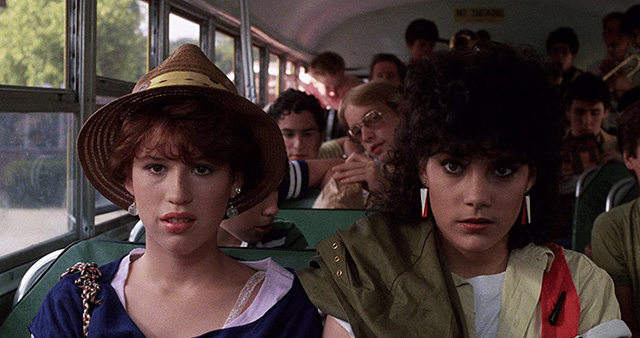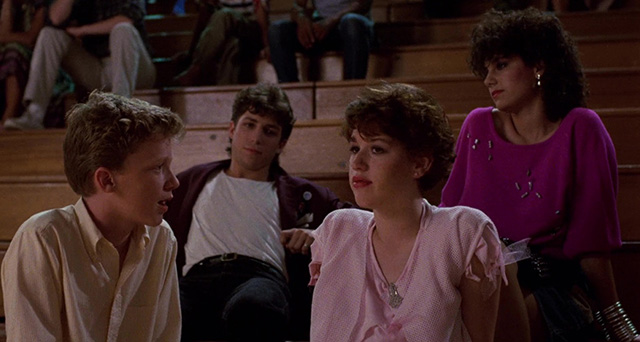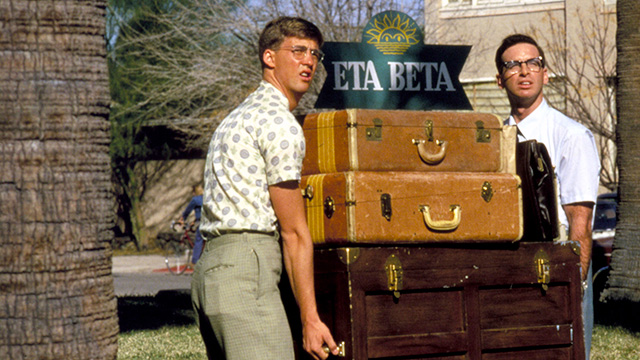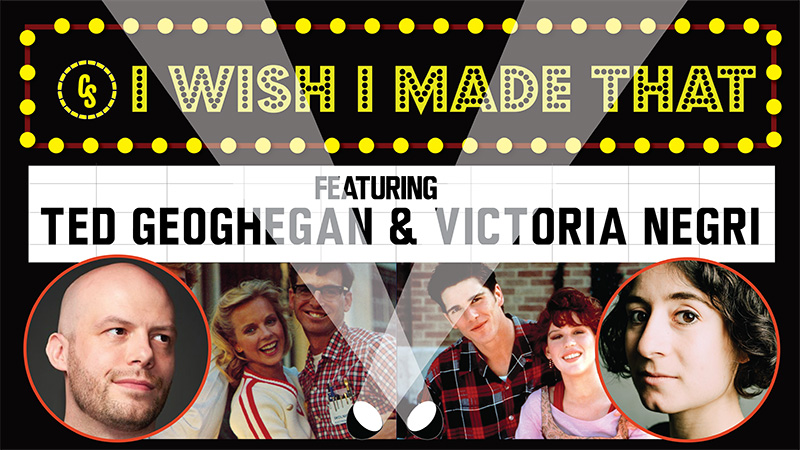Welcome to this month’s edition of ComingSoon.net’s I Wish I Made That, in which filmmakers Ted Geoghegan (We Are Still Here, Mohawk) and Victoria Negri (Gold Star) each pick a film they wish they had actually made! This discussion takes us back to school with the comedies Revenge of the Nerds (1984) and Sixteen Candles (1984). Check out their conversation below!
RELATED: I Wish I Made That: Mars Attacks & Critters
Victoria Negri is an actress, producer, writer, and director known for The Walk (2020) and The Fever and the Fret (2018). Gold Star, her 2017 debut feature as director, served as the final onscreen performance by noted actor Robert Vaughn. You can purchase Gold Star by clicking here
Ted Geoghegan studied screenwriting under the tutelage of the late Carroll O’Connor. After writing numerous genre features in Europe and The United States, he made his directorial debut with the 2015 horror film We Are Still Here, then followed it up with the Native American revenge movie Mohawk (2017). Click here to purchase We Are Still Here, and click here to purchase Mohawk!
Geoghegan recently began a well-received podcast titled “This is Not a Story About…” Each episode of the program begins as the story of someone or something in the world of film that cinephiles know very well, but transforms into an expertly-researched tale about a new topic: one that can be closely-related or worlds away from where its story began. You can listen to the podcast by clicking here!
RELATED: I Wish I Made That: Valley Girl & Vampire’s Kiss
I WISH I MADE THAT #5: BACK TO SCHOOL OCTOBER
Ted Geoghegan: Okay, so September might already be coming to an end, but to celebrate the “Back to School” season, we’re back with an all-new I Wish I Made That, and we’re talking about troublesome films about school. Hey Victoria, I hope you had a nice end to the Summer season!
Victoria Negri: Yes, it still kind of feels like March, but summer is over! I definitely was feeling nostalgic again in thinking about back to school films. So I picked Sixteen Candles, which I watched a bunch of times growing up and always was like, yep, Molly Ringwald is like me. So any movie with her I was into. And you picked Revenge of the Nerds, which I’ve actually seen. A lot of your picks were first watches for me, but this was a revisit. I hadn’t seen it since I was a teenager. And whoa, I forgot so much of it and was surprised and horrified.
Geoghegan: It’s a deeply problematic film. I grew up with it, first watching it in 1988 (at age nine!) and have been continually floored, again and again, by how toxic it is.
Negri: Wow you watched it at nine?!
Geoghegan: Yep! And, as a child, I thought of it as nothing but carefree fun – a joyous, triumphant story of nerds getting back at their tormentors, winning the day, and getting the girl! And it is NONE of those things.
Negri: It wants to be that.
Geoghegan: Even by the lax moral standards of the mid-80s, it’s shockingly toxic in its depiction of these nerds. They’re unjustly bullied, sure… but because of it, they become violent, ghoulish villains masquerading as cutie-pie Angels of Vengeance.
Negri: Yeah, it’s a disappointing film about bullying, when you can’t beat them, join them kind of message.

Geoghegan: The final act of the film where – SPOILERS – they sell nude photos of sorority girls who rebuked their advances is already horrible… but then the film’s lead – ITS HERO – puts on a mask, pretends to be a girl’s boyfriend, and has sex with her!
Negri: Yeah, I was horrified. And shocked I didn’t remember any of those things!
Geoghegan: And – in a twist that even the craziest male fantasy would call mad – she’s not at all upset, and ends up dumping her boyfriend for the nerd because he’s “so good at sex.”
Negri: I just remembered what you did, it’s a triumphant of nerds. But it’s so sinister, actually, masked literally and figuratively in the underdog winning.
Geoghegan: Even the less offensive stuff is still wildly off the mark. The way the film treats its two minority nerds – Lamar, who is both gay and Black, and Takashi, who is every. single. Racist Japanese stereotype – is groan-inducing. And a throwaway joke about accidentally playing “Swing Low, Sweet Chariot” around two older Black men is next-level head-scratcher. Like, was that EVER funny? No. No, it was not.
Negri: Yeah, it’s brutal. Lamar could’ve been great if they didn’t write him in such an awful way. Watching that actor, I was like, he can do a lot! Write him something better. He’s funny, he doesn’t need these cheap jokes. I can’t imagine how frustrating it must’ve been to be that actor.
Geoghegan: And yet, as a kid, I thought nothing of any of this! Which is a big reason why I wanted to tackle this film.
Negri: Yeah, I’m glad you chose it. I’d only seen it once maybe when I was 16 or 17 and I didn’t remember any of it. Now it’s imprinted on my brain. A lot of it made me so angry. No one in the film is believable in what they do, that scene where the protagonist puts a mask on and has sex with the popular cheerleader character is so awful. And she went with it and was like, oh, this is great. You were so good! I wanted to punch my laptop screen. It’s like this twisted fantasy or something that made me so upset. And what does it leave people with? What’s the point of the movie?
Geoghegan: The film, I suppose, accurately portrays how the bullied can, themselves, become bullies… and often do things far more horrible than that of their original aggressors. That was not its agenda.
Negri: Yeah, the tone is really off, then. You’re right, that’s the only message to get from it.
Geoghegan: You, however, chose Sixteen Candles for your film this month, a movie I hadn’t seen since my teen years and I found, well… maybe not equally as problematic, but far more so than I remembered. Tell me more.

Negri: Yeah, I was shocked by it, too. I remembered the character Long Duk Dong as being extremely racist, but there was so much in there directed at Sam (Molly Ringwald) that was awful. A scene with her grandparents where they literally grab her breasts and talk about their size was one moment framed as being light-hearted that was just not good. It’s just disappointing to me because I think as a young girl society trains you that your body isn’t really your own, and I know I felt that a lot growing up and this movie really sends that home.
Geoghegan: I absolutely felt the same way. That scene was amusing to Little Ted, yet made Adult Ted deeply, deeply bummed. It’s very unaware of what it’s doing… a’la Revenge of the Nerds, I suppose.
Negri: Definitely unaware. There are some jokes in there that feel cheap, too, in the same way. Just crass to be crass. The gong sound cues to every time Long Duk Dong is on screen were so lazy. I don’t even remember how I felt about that scene specifically as a young person. I’m sure I was horrified by it, but not in the same way, I probably just internalized it and was like, yeah, makes sense, and moved on.
Geoghegan: Also, as a boy watching that sequence, it was “funny.” Because boobs were funny. Had the grandparents grabbed their grandson’s crotch and admonished its size, I likely would have felt very differently.
Negri: Yeah, and also we don’t see the boob grab, we see the hands coming in and then her freaking out in her room, so that’s how the filmmakers get away with it. But just because you don’t show the action doesn’t mean it’s any less horrifying
Geoghegan: As far as Long Duk Dong goes, it’s just awful. Asian characters in Western cinema – particularly men – were portrayed as being devoid of any normal humanity, and continue to get the short end of the acting stick, even now. Similar to Larry B. Scott, the actor who played Lamar in Revenge of the Nerds, Gedde Watanabe is a gem of a performer. He deserves so much better than to be remembered for that racist mess of a role.
Negri: What I wonder is, these movies could’ve actually done something interesting in satirizing people who have these terrible viewpoints.
Geoghegan: Yeah, to show their perceptive on this. Lamar needs his own film. And one that’s not cliched and awful. One where he’s funny, but portrayed as human.
Negri: Agreed.
Geoghegan: I would have loved to see a comedy filmmaker find the humor in being a person of color, LGBTQ+, or any other minority back in the 80s. Because, while so much pain can come from this, so much good can, as well. Not to get off-topic, but John Carpenter does an amazing job of this in Big Trouble in Little China, where the film’s hunky white hero, Jack Burton, is the unwitting sidekick to the picture’s actual hero, an unassuming young Chinese man who no one gives the proper respect to.
Negri: Yes! You’re so right. Not off topic at all. I think in I Wish I Made That, citing films that succeed at what we wish we could change in the films at hand is awesome. Wang Chi, the actual hero in Big Trouble in Little China, spends the whole movie trying to get the audience – and everyone around him – to understand that he’s the hero of the film, not the big lumbering oaf who gets top billing on the poster. It’s hilarious, poignant, and wickedly clever. Give me so much more of that. I want to re-watch Big Trouble. It’s been a while. I think my dad loved it, which makes me happy.
Geoghegan: Definitely give it a re-watch. It’s a masterpiece – and totally not a film I would ever want to make. It’s perfect just as it is. There is a universe where Lamar, Takashi, and Long Duk Dong all get a film like that. Or rather, an opportunity to be a fully-realized character.
Negri: I want to see that movie. I wonder what Molly Ringwald’s character in Sixteen Candles movie could be.

Geoghegan: Well, along those lines, let’s pivot to what you’d do with Sixteen Candles if you had the opportunity to make it. Let’s say it’s a given that all the racism is gone. Then what?
Negri: I think what disappointed me about the movie too is that the main character, Sam, is obsessed with her popular guy who doesn’t even know she exists, really. He’s only into her once he finds out she likes him. I want to see a film where she realizes he’s actually awful (he does some terrible things in the film that make me scratch my head) and realizes that she doesn’t need to be associated with someone like that. It’s really also a film about class, where he’s super rich and she’s into him. So that feels iffy also. But really, the story that I would’ve loved as a teenager is not needing to be with the popular kid as we’re kinda trained to want, but just realizing hey, I should want to be with someone who actually knows me and understands me. I think I needed to see films like that when I was growing up.
Geoghegan: Even the term Sixteen Candles is so often equated to adulthood and, in most cases, womanhood. Embracing your lead’s individuality and intelligence as they become an adult seems like a given, no?
Negri: Yeah, I think seeing an actual coming of age story of a character realizing her worth, and overcoming societal expectations would feel great.
Geoghegan: Amen.
Negri: There were so many films when I was growing up about girls who were all of a sudden “discovered” by the popular boys and those made me furious. This isn’t exactly that in a literally sense of Molly Ringwald transforming, but it’s still at the heart of the story. I think P.S. To All the Boys I Loved on Netflix succeeds here actually.
Geoghegan: I haven’t seen that one, but am putting it on the list!
Negri: Yeah, I was like – finally! There was a moment in Revenge that was actually kinda there in this way that I liked. And out of context of the rest of the film would be fun.
Geoghegan: Which one?
Negri: In the computer room I think when Judy and Gilbert exchange glasses, it was actually really sweet. I was like, oh, two nerds like each other, they’re not trying to be anyone else or compete or bully. That is a nice moment. Gilbert and Judy are basically the only two redeeming characters in the film. And, to be honest, the only two that are kind of believable.
Geoghegan: Everyone else is just awful or a caricature.
Negri: Yeah, I actually jotted some notes down while watching and wrote, “They’re non-spazzy and sweet when they’re on their own, which is refreshing.”
Geoghegan: I’d like to say that in my Revenge of the Nerds, I’d just knock it down and start from scratch, but in keeping with what we do here, my take on the film would be that – if it were to follow the same plot structure – the nerds, who have been humiliated and made to feel subhuman by the jocks, spend the film coming up with more and more complex ways for the jocks to feel the same emotions the nerds feel. These are brilliant geeks. With their combined intelligence, they can absolutely come up with a way to make a strong man feel weak, or a confident man to feel shy.

Negri: To me, that’s what the original film wanted to be, but failed catastrophically at. I mean, the geeks’ intelligence was actually kinda wasted in the film.
Geoghegan: Truth. The titular “Revenge” of Revenge of the Nerds should not have been a goddamn panty raid, followed by revenge porn. Ugh.
Negri: They have those competitions, but that’s not linked to anything really emotional other than just competition and embarrassing the jock guys.
Geoghegan: Exactly!
Negri: Whipped cream pies covering naked photos? Ridiculous. Most disappointing nerds ever.
Geoghegan: After being humiliated by assholes, the nerds just take it upon themselves to just be bigger assholes. That’s not revenge. That’s just being an asshole.
Negri: Totally. It’s so lazy.
Geoghegan: Being able to talk about this has been refreshing. We’ve spent the past few months talking about films that we wish we’d made because we love them so much. And to talk about films that we once loved, but now don’t… I think we might be onto something here, eh?
Negri: Yeah there was something really cathartic about it, too. Like I need to go back and realize some stuff about my younger self, also, and how society and culture has a deep impact on how we all view art. And age. I’d like to give myself some benefit of the doubt and say I missed some of the horrific elements of these films when I was young because I was just, well, young. But wow, it was eye-opening to revisit.
Geoghegan: Here’s to that. And to tie it into heading back to school, when young people are often as their most fragile, certainly helped drive this home for me. Movies can and should do better.
Negri: Agreed! I look forward to our next edition!!!
Geoghegan: I can’t wait, Victoria. As always, it’s a pleasure to break free from this garbage reality and spend some quality time talking movies.
Negri: Always. This has made my day.
Geoghegan: Back at ya.










